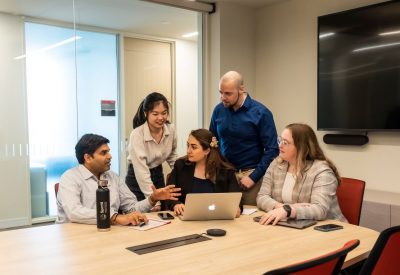- Expand community-based research and community-based pedagogy opportunities for the benefit of researchers, students, instructors, and our communities
- Expand co-op, internships, and other work-integrated learning opportunities for students
Expand community-based research and community-based pedagogy opportunities for the benefit of researchers, students, instructors, and our communities
- Encourage students to incorporate elements of community engagement as part of capstone projects
- Continue to support I-CUREUS and SaPP initiatives
- Provide opportunities for work-integrated learning with the not-for-profit sector and volunteering for academic credit (practicum)
- Create academic experiences that facilitate students undertaking community-engaged research projects
- Support and disseminate best practices in research such as the “Community-based Research toolkit” from the Centre for the Study of Poverty and Social Citizenship and the “Community-Campus Engagement Tools” from the Centre for Community Innovation
- Encourage Carleton community members to join boards of local and community organizations
Additional information about Carleton’s activities in this area is available in the Kinàmàgawin report; and the Strategic Plan for Community Engagement (SP4CE)
Expand co-op, internships, and other work-integrated learning opportunities for students
 Encourage Faculties to develop program components that are accessible and flexible enough to integrate co-op, internships, and other work-integrated learning into degree requirements
Encourage Faculties to develop program components that are accessible and flexible enough to integrate co-op, internships, and other work-integrated learning into degree requirements- Grow FutureEdge offerings through targeted microcredential and other training packages
- Develop the global citizen scholar model by articulating and defining what attributes and proficiencies help prepare students/graduates to be committed to societal betterment. In developing this program ensure that modules can be easily integrated into courses or act as standalone micro-credentials. Create greater awareness for instructors to see how this can be integrated in other disciplines
- Explore the creation of a Degree-Level Expectation related to skill development and workplace preparedness
- Actively contribute to national work-integrated learning opportunities (both funded and unfunded), e.g., Mitacs (funded) and CARTAMS (unfunded)
Additional information about Carleton’s activities in this area is available in the Students and Enrolment Strategic Plan
